لمحة عامة عن صناعة الإعلانات في مصر والعالم العربي
التطورات والتغييرات في مجال إنتاج الإعلانات عبر الزمن
تأثير الذكاء الاصطناعي على مجال الإعلانات التجارية
مقدمة سريعة للمرحلة الثلاث لإنتاج الإعلانات:
مرحلة ما قبل الإنتاج
مرحلة الإنتاج
مرحلة ما بعد الإنتاج
تحليل حالات: تفكيك حملات إعلانية ناجحة من منظور الإنتاج
IN THIS WORKSHOP
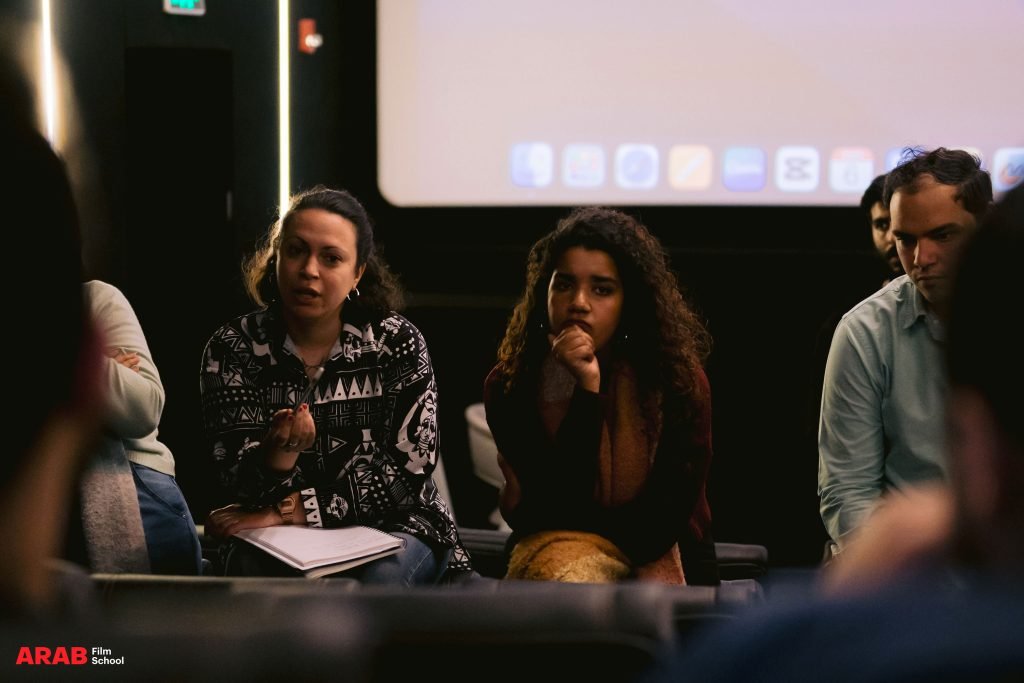
1
DIRECTING
2
SCRIPTWRITING
3
CINEMATOGRAPHY
4
DIRECTING ACTORS
5
FILM CRITIQUE
6
GRDADUATION PROJECTS
01. DIRECTING | Mohamed Nader
DIRECTING FUNDAMENTALS
- Characteristics & elements that control the cinematic composition.
- Show don’t tell!
- Rule of Thirds/ Golden Ratio
- in/ out of shot (the cut rule)
- Match cut, rough cut, hidden cut, insert, cutaway.
- Enter/ Exit frame.
- Cut on action
- Rhythm Triangle (incident ,time ,emotion)
- Continuity in the scene.
- Camera angles.
- Character angles.
- How to visually introduce my idea.
- Economy in cutting, linking shots.
- Adjust my scene.
- 180 Rule
- Types of shots
- Coverage (internal and external cuts)
- Shared space and closed space.
- Head Room and Nose room.
- Depth in cinematic composition
- How to make depth FG, MG, BG, Depth cues.
- Geography of location (dramatical use of location)
- Sizes in shot
- Establishing & ending shots (how to establish and end a scene?)
- Kinds of rhythm (moments, beats, etc.)
- How to visualize my scene and break it down (different visual styles)
- Camera work
- One shots and long takes
- Mise en scene (blocking, stagging) in fixed cadres in the camera work.
Lenses:
- Type of lenses
- How to use lenses in a dramatic way
- Visual progression
- Directing actors
- introduction to the basics of Drama.
- Three Acts Structure
- Scene structure (obstacles, beats)
- Character study.
- Visual details in the script.
- Dialogue and subtext.
- The emotional journey.
- Conflict, midpoint crisis, climax, realization.
- Plantation and payoff.
- Incidents in the script.
- Plot : central plot, sub plot (elements of the plot)
- Inciting Incident
- Creation of scene and act.
- Dialogue and inner monologue
- The structure of the story
- Conflict (inner- outer)
02. Scriptwriting for Short Films
– This module is delivered by Amina Moustafa in collaboration with Wael Hamdy.
Part One: Writing Fundamentals (Teaching Phase)
This part focuses on teaching the core principles of short film screenwriting, and includes:
- The Difference Between Feature Film and Short Film Screenplays
Understanding the fundamental distinctions between feature-length and short film screenplays.
- Analyzing the Short Film Screenplay
Learning how to analyze a short film screenplay in a focused and concise manner.
- Developing the Idea
Defining and summarizing the core idea clearly and effectively.
- Key Factors of a Short Film: Duration, Budget, and Timeline
Exploring the practical elements of short films, including duration, production cost, and timeline.
Part Two: Script Development (Development Phase)
This part moves into hands-on development of the written scripts, and includes:
- Carefully Reviewing and Improving the Screenplay
Refining the screenplay to ensure narrative coherence and alignment with dramatic standards.
Selecting the Appropriate Setting and Time for the Story
Choosing suitable locations and timeframes that enhance the story and clarify the progression of events.








03. CINEMATOGRAPGY
- Introducing what a filmmaker needs to comprehend about cinematography.
- Introducing the visual communication among the director, director of photography, and the remaining technical team:
- Director: The director holds the creative and overarching artistic responsibility for the film.
- They define the artistic vision and guide the artistic performance of actors, collaborating with the director of photography to realize this vision.
- Director of Photography: Responsible for managing the visual elements of the film.
- How to select the visual approach for various artistic works.
- Defining lens types and their diverse applications.
- Introduction to the lighting circle and its application in creating scenes with varying light contrasts (high, low, black and white).
- How to effectively operate with the equipment at hand.
- Learning the systematic approach to prepare for filming an artistic piece and how to choose a style that enables the audience to swiftly engage with the dramatic narrative.




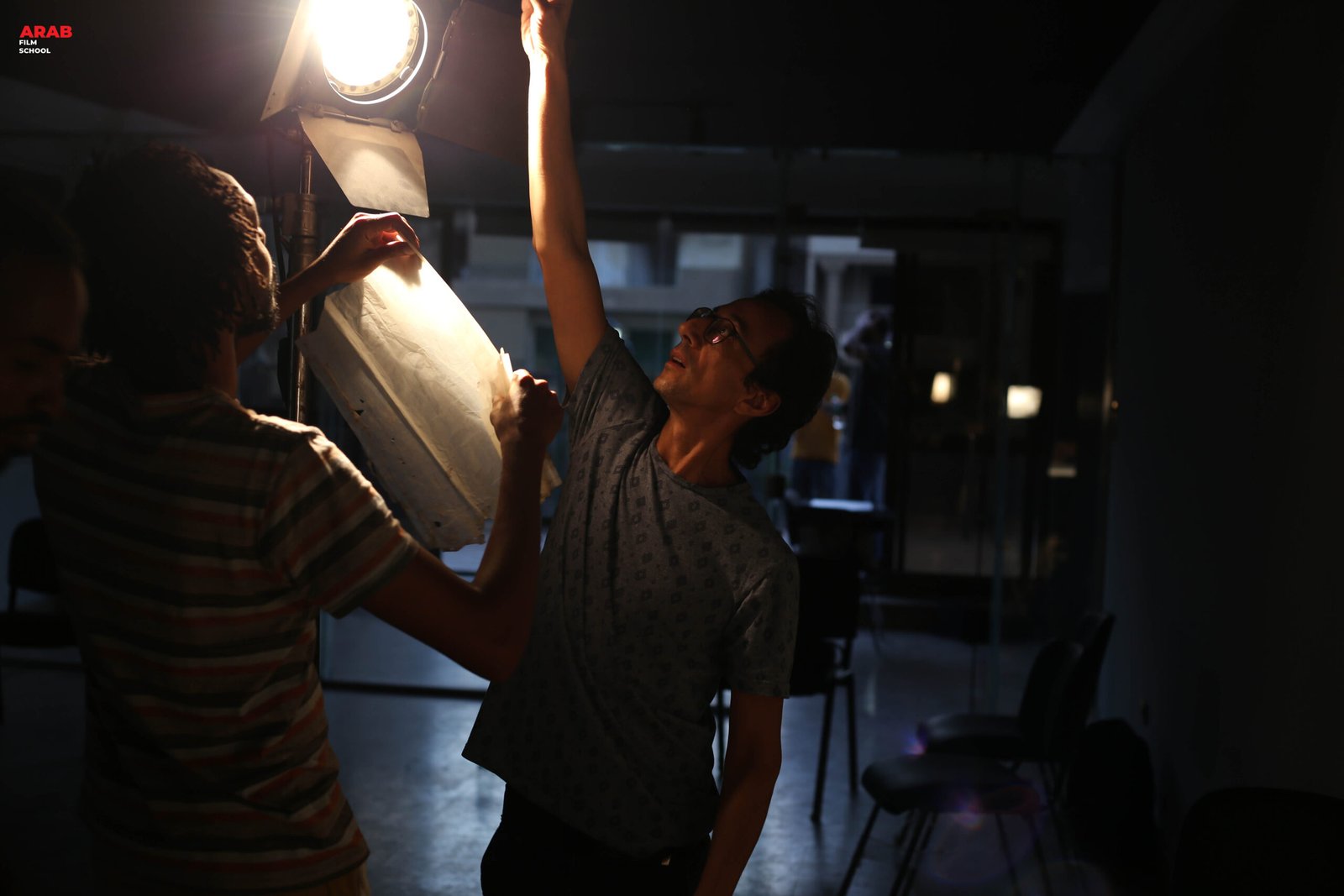
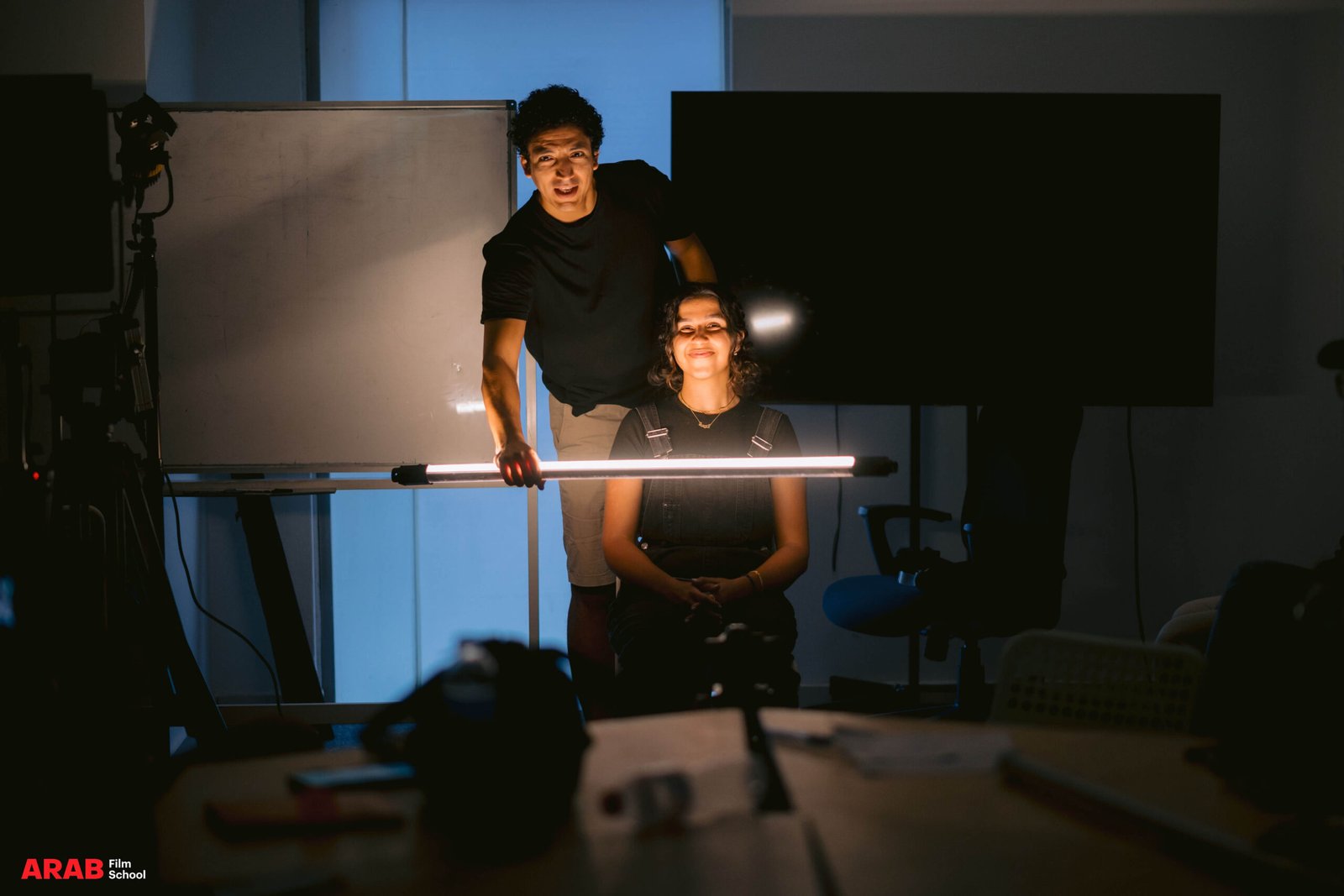
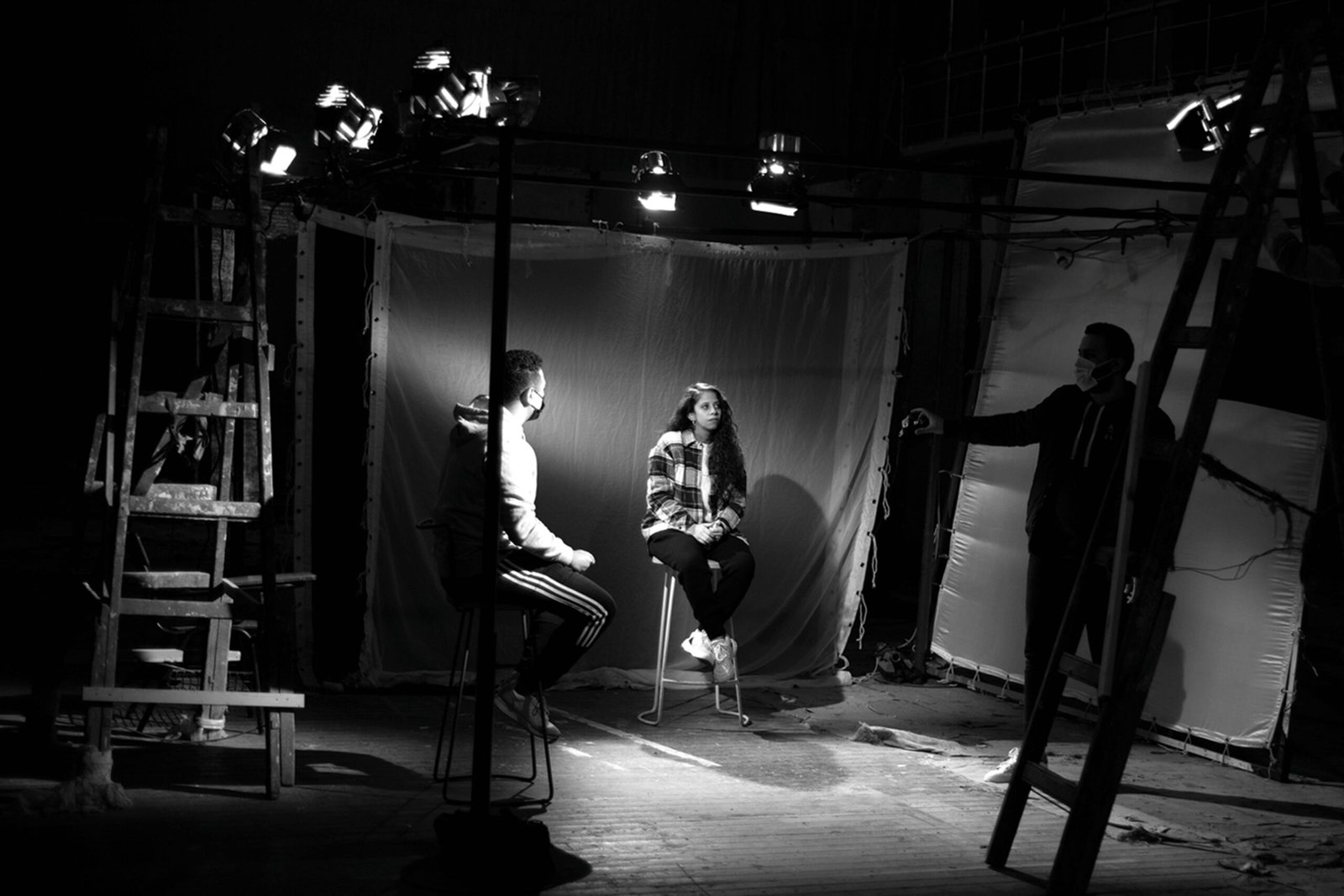
04 DIRECTING ACTORS | Amr Abed
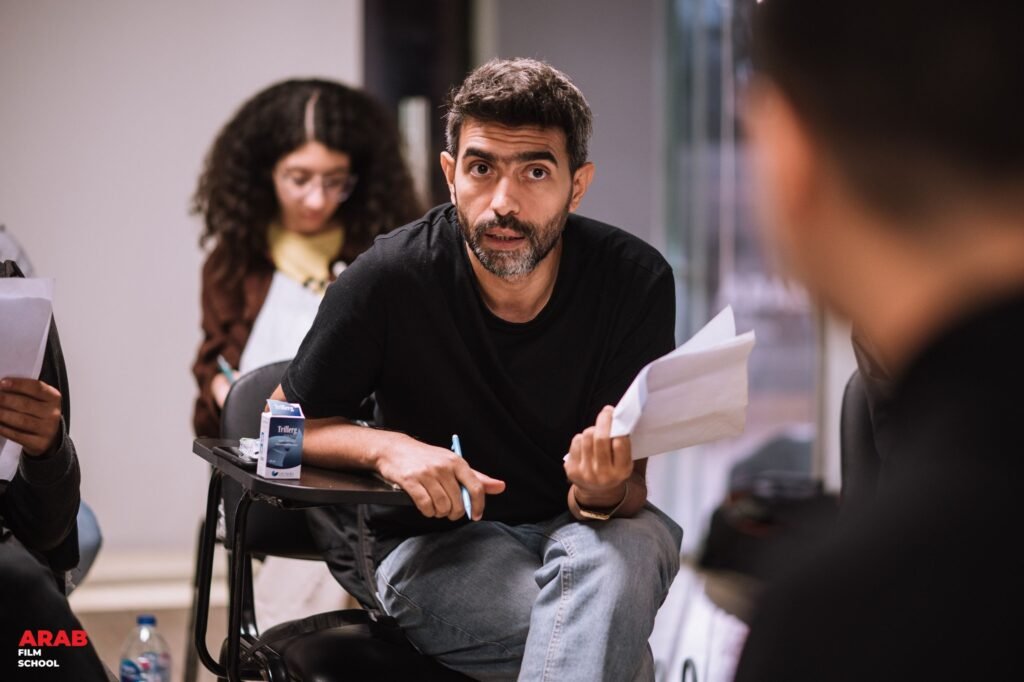
- These two sessions aims to equip young filmmakers with fundamental techniques and practical experiences needed to direct actors effectively, emphasizing the importance of collaboration and communication for a successful film production:
– Understanding the Art of Directing Actors
– Actor-Director Relationship
– Directing Techniques
– Scene Analysis and Rehearsals
– On-Set Directing
– Screening and Feedback
05 FILM CRITIQUE | Ahmed Shawki
in this interactive session, film critic Ahmed Shawky will guide students through the essentials of submitting their films to festivals, with peer feedback on their final project ideas.
Key topics will include:
- Submission Essentials – Steps for applying to festivals, selecting the right events, and preparing a festival-ready press kit.
- Securing Funding – Exploring grants, sponsorships, and other funding options for independent filmmakers.
- Making Connections – Tips for networking, pitching to industry partners, and understanding what festival juries prioritize.
- Maximizing International Reach – Adapting submissions for global festivals and navigating cultural nuances.
06 GRADUATION PROJECTS
The graduation project is divided into four main sections, each representing a key step towards
1. Pre-Production
Film Development
The film development phase is the pre-production stage where students finalize their scripts, discuss budgets, and adjust projects based on available resources. It involves selecting the crew, casting actors, scouting locations, creating shooting lists, and scheduling filming days, all under the supervision of Mohamed Nader and the guidance of the Arab Film School.
Script Development + Directing Development
It will be conducted over a specified number of lectures for all students, ranging from 4 to 6 lectures.
It will be led by trainer Mohamed Nader, in collaboration on the screenplay with Amina Mustafa.
This phase also includes a set number of individual sessions for each student.
- Casting
- Location Scouting
- Assembling the Crew
2-shooting
Arab School provides a full shooting day with a professional crew and a limited selection of professional filming equipment, including the Sony FX6 camera, lenses, professional lighting, and a skilled director of photography and production manager. The only thing the student needs to provide is the location fee.
3-Post production
Post-Production Services:
Arab Film provides students with a specialized company in the field of post-production to complete their films. This includes a limited number of sessions for EDITING, COLOR GRADING, SOUND DESIGN, and creating the official POSTER for the project.
4- Screening
Post-Production Services:
The film screening is divided into two parts. The first part is the private screening
organized by Arab Film School, where many artists, directors, and producers are invited.
The second part is the screening at international festivals
More Information
Duration
- Number of sessions: 38 Sessions – 154 Hour
Fees
- 48,000 EGP
Venue
- 124 Othman Ibn Affan, Street, Heliopolis
Date and Time
Starting date:
Starting on Sunday, April 26th, 2026
Workshop days: Sundays, Tuesdays, and Thursdays at 7:00PM and until 11:00PM
Refund Policy
- Before 20th of March r 2026, participants will receive a full refund
- From 20th of March 2025 until 27th of March 2026, participants will receive a 50% refund of the total price.
- After 27th of March 2026, participants will not be eligible for any refund
الهدف من الورشة
هدف الورشة: تهدف هذه الورشة إلى إرشاد المتدربين خلال عملية ما قبل الإنتاج الكاملة لإعلان احترافي، بدءًا من الفكرة وحتى تسليم النسخه الجاهزة للعميل.
المشروع النهائي: في نهاية الورشة، سيقوم كل طالب أو فريق (حسب عدد المشاركين) بإعداد حزمة متكاملة لمرحلة ما قبل الإنتاج لإعلان جاهز للتصوير. ورغم أن هذه الورشة لا تتضمن مرحلة التصوير، إلا أنها مصممة لتعكس سير العمل الحقيقي في الصناعة والمتطلبات الفعلية للتسليم.
فرصة حضور تصوير إعلان حقيقي: سيتم اختيار طلاب أو فريق معيّن (وفقًا لأدائهم في المشروع النهائي) لحضور تصوير مشروع المدربةالإعلاني القادم لمدة يومين — على أن يتم تحديد موعده من قبلها وفقًا لجدولها. يشترط التواجد في القاهرة لكي يكون الطالب أو الفريق مؤهلًا للفوز بالمشاركة، مما يتيح لهم فرصة فريدة لمشاهدة سير العمل في موقع تصوير حقيقي واكتساب خبرة خلف الكواليس داخل بيئة إنتاج احترافية.
المقدمة ونظرة عامة على الصناعة
أساسيات الإبداع
الموازنة بين الرؤية الإبداعية وإمكانية التنفيذ الإنتاجية
لمحة عامة عن الأقسام الرئيسية داخل الوكالة:فريق الإبداع
فريق الإخراج الفني
فريق إدارة الحسابات
فريق الإنتاج
الإبداع عمليًا وأدوار أعضاء الفريق.
تمرين عملي: العمل على موجز حقيقي
مهمة من منظور إبداعي
كيف ينسّق المنتجون ويتواصلون مع كل فريق
محاكاة لعب أدوار: سيناريوهات التواصل الداخلي
التخطيط ما قبل الإنتاج
التخطيط ما قبل الإنتاج
تفكيك معالجة المخرج إلى عناصر إنتاجية
اختيار المخرجين، والفريق، والمتعاونين الرئيسيين
استكشاف المواقع
بناء لوحات القصة (Storyboards)، ولوحات المزاج (Moodboards)، والأزياء، ونماذج اختيار الممثلين (Casting Sheets)
كيفية إدارة اجتماع ما قبل الإنتاج (PPM) بكفاءة وتركيز
إدارة الإنتاج أثناء التصوير
جدولة وإدارة أيام التصوير
الإشراف على اللوجستيات، والجداول الزمنية، وتدفق الموارد
الهيكل الوظيفي على موقع التصوير (أدوار كل فرد في فريق الإنتاج)
مقدمة عن دور كل شخص على موقع التصوير، وليس فقط أفراد الفريق الأساسيين
التحديات أثناء التصوير والميزانية
إدارة الأزمات واتخاذ القرارات تحت الضغط
دراسة حالة: تحديات إنتاج حقيقية وكيف تم التعامل معها
إعداد الميزانية وإدارة التكاليف
ترجمة معالجة المخرج إلى عرض سعر نهائي
الميزانية المتقدمة وما بعد الإنتاج
إدارة الميزانيات المفتوحة مقابل الميزانيات الثابتة
قيود الميزانية الواقعية وكيفية التعامل معها
سير العمل في مرحلة ما بعد الإنتاج
العمل مع المحررين، ومهندسي الألوان، ومصممي الصوت، والمكساج الصوتي، والتحريك
الختام والاتجاهات المستقبلية
إدارة جولات التعديلات والتعامل مع ملاحظات العميل
ضمان أن التسليمات النهائية تفي بالتوقعات التقنية والإبداعية
مناقشة المشاريع النهائية للطلاب
أسئلة مفتوحة






عن هاجر عامر
هاجر عامر هي منتجة مصرية تخرجت من الجامعة الألمانية بالقاهرة حاصلة على درجة البكالوريوس في الفنون التطبيقية، تخصص الإعلام. تابعت دراسة الماجستير في تأليف الوسائط التفاعلية. بدأت هاجر مسيرتها المهنية كمساعدة منتج ومساعدة مخرج، قبل أن تختار التخصص في الإنتاج، وأسست فيما بعد شركة الإنتاج الخاصة بها.
قدمت وأسهمت في نجاح العديد من الحملات الإعلامية الكبرى لعلامات تجارية مثل بنك مصر، OLX، بسكريم، بيبسي، فيزا، نون، مستشفى 57357، جامعة القاهرة والعديد غيرها.
أعمال هاجر
معلومات أخرى
Duration
عدد المحاضرات: ٨ جلسات
Fees
- 4500 SAR
Venue
المكتب رقم 10، الطابق الثاني
المبنى رقم 3654، طريق أنس بن مالك
حي الياسمين، الرياض، المملكة العربية السعودية
Date and Time
الأسبوع الأول:
الخميس، 15 يناير | 6:00 مساءً – 10:00 مساءً
السبت، 17 يناير | 6:00 مساءً – 10:00 مساءً
الإثنين، 19 يناير | 6:00 مساءً – 10:00 مساءً
الثلاثاء، 20 يناير | 6:00 مساءً – 10:00 مساءً
الأسبوع الثاني:
الخميس، 22 يناير | 6:00 مساءً – 10:00 مساءً
السبت، 24 يناير | 6:00 مساءً – 10:00 مساءً
الإثنين، 26 يناير | 6:00 مساءً – 10:00 مساءً
الثلاثاء، 27 يناير | 6:00 مساءً – 10:00 مساءً
Refund Policy
قبل يوم الإثنين، 20 نوفمبر 2025 – سيحصل المشاركون على استرداد كامل للمبلغ.
من الإثنين، 20 نوفمبر إلى الأحد، 2 ديسمبر 2025 – سيحصل المشاركون على استرداد بنسبة 50٪ من السعر الإجمالي.
اعتبارًا من الإثنين، 3 ديسمبر 2025 فصاعدًا – لا يُسمح بأي استرداد.
IN THIS WORKSHOP
Workshop Goal: This workshop aims to guide students through the complete pre-production process of a professional commercial, from concept to client-ready package.
Final Project: By the end of the workshop, each student or group (Depending on number of students) will have developed a complete commercial pre-production package, ready to be shot. While this workshop does not include filming, it is designed to reflect real industry workflows and deliverables.
On-Set Shadowing Opportunity: Select students or group will be chosen (Depending on their performance in the flinal project) to accompany the instructor on set during her next commercial project (The date of which will be set by the instructor depending on her schedule), offering a unique chance to observe a real shoot in action and gain behind-the-scenes exposure to a professional commercial production environment.
Introduction & Industry Overview
- Introduction
- Overview of the advertising industry in Egypt and the Arab world
- Progress and changes in ads production field through time
- AI impact on commercial ads field
- Quick introduction to the three production phases:
– Pre-production
– Production
– Post-production
- Case analysis: deconstructing successful ad campaigns from a production perspective
Creative Foundations
- Understanding insights, tone of voice, main concept, execution
- Balancing creative vision with production feasibility
- Overview of key departments within an agency:
– Creative Team
– Art Direction Team
– Account Management Team
– Production Team
Creative in Action & Team Roles
- Hands-on exercise: working with a real brief
- Assignment from a creative perspective
- How producers coordinate and communicate with each team
- Role-play simulation: internal communication scenarios
Pre-Production Planning
- Pre-production planning
- Breaking down Directors treatment into production elements
- Selecting directors, crew, and key collaborators
- Location scouting
- Building storyboards, moodboards, wardrobe, casting sheets
- How to run an efficient and focused Pre-Production Meeting (PPM)
On-Set Production Management
- Scheduling and managing shoot days
- Overseeing logistics, timelines, and resource flow
- Role hierarchy on set (individual roles of a production team)
- Introduction to the role of everyone on set, not only key crew
On-Set Challenges & Budgeting
- Crisis management and decision-making under pressure
- Case study: real production challenges and how they were handled
- Budgeting and cost management
- Translating director’s treatment to a final quotation
Advanced Budgeting & Post-Production
- Managing open vs fixed budgets
- Real-world budgeting constraints and how to work around them
- Post-production workflow
- Working with editors, colorist, sound designers, audio mix, animation
Finalization & Future Trends
- Managing rounds of edits and handling client feedback
- Ensuring final deliverables meet technical and creative expectations
- Discussing final student projects
- Open questions






About Hagar
Hagar Amer is an Egyptian producer who graduated from the German University in Cairo with a Bachelor’s degree in Applied Arts, majoring in Media. She pursued a Master’s degree in Interactive Media Composition. Hagar began her career as an assistant producer and assistant director, eventually choosing to focus on production and went on to establish her own production house.She has executed and contributed to the success of numerous major media campaigns for brands such as Banque Misr, OLX, Biskrem, Pepsi, Visa, Noon, 57357 Hospital, Cairo University, and many others.
